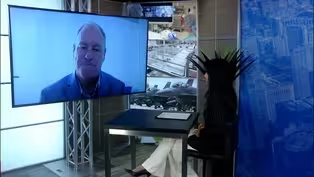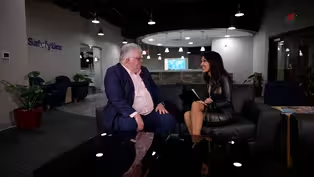Business | Life 360 with Kristi K.
Regional Growth Partnership
Clip: 4/20/2023 | 7m 22sVideo has Closed Captions
Kristi visits the Northwest Ohio Regional Growth Partnership.
What is most important for regional success? Attracting a talented workforce, building corporate equity, or enhancing the region’s natural amenities to attract people for better quality of life? We’ll find out. And the answer may not be that simple. Kristi heads out to talk with the Northwest Ohio Regional Growth Partnership CEO to get some answers!
Problems playing video? | Closed Captioning Feedback
Problems playing video? | Closed Captioning Feedback
Business | Life 360 with Kristi K. is a local public television program presented by WGTE
Business Life 360 with Kristi K. is made possible in part by KeyBank National Association Trustee for the Walter Terhune Memorial Fund and ProMedica Toledo Hospital, celebrating 150 years of serving our community.
Business | Life 360 with Kristi K.
Regional Growth Partnership
Clip: 4/20/2023 | 7m 22sVideo has Closed Captions
What is most important for regional success? Attracting a talented workforce, building corporate equity, or enhancing the region’s natural amenities to attract people for better quality of life? We’ll find out. And the answer may not be that simple. Kristi heads out to talk with the Northwest Ohio Regional Growth Partnership CEO to get some answers!
Problems playing video? | Closed Captioning Feedback
How to Watch Business | Life 360 with Kristi K.
Business | Life 360 with Kristi K. is available to stream on pbs.org and the free PBS App, available on iPhone, Apple TV, Android TV, Android smartphones, Amazon Fire TV, Amazon Fire Tablet, Roku, Samsung Smart TV, and Vizio.
Providing Support for PBS.org
Learn Moreabout PBS online sponsorshipKristi: As we discuss our business life, 3060 topic of how to grow and develop a region, particularly in the Midwest, we are now on site at the Regional Growth Partnership in Toledo, Ohio, to discuss this Midwest region's opportunity and potential for growth.
And I'm here now with Dean Montague, the president and CEO.
So, Dean, it's great to be with you today.
Well, thanks.
Dean: For having me on.
I appreciate it.
Kristi: As we dive into our topic, Dean, of how to successfully develop and grow a region, what are some of the specific factors or key indicators, if you will, that we look at in terms of regional growth?
Dean: Well, first of all, it's got to begin and end with collaboration.
I've always said that's a really easy word that people throw around quite a bit.
Collaboration, it's a lot tougher and practice to make it happen.
And I think if you really look at a lot of the what people would consider agencies, whether it be in RG, PE, the Port Authority, the chamber and others, we have all kind of come up together.
Those of us that are now leading these organizations kind of came up together, have known each other for over 20 years.
So I think that collaboration, which really is based on trust and not having an agenda and not trying to build kingdoms but work with your partners, that's really the key to it and that's how I think you begin to build a region by getting everyone on the same page.
Kristi: So when you talk about your track record here, you track record of success.
How do you define that?
Is it the number of businesses you bring in, a number of people who come into the region?
How is it defined here?
Right.
Dean: That's a great question.
Success is defined like most regional economic development groups around the country.
There's really three core things that our board really cares about.
It's how many projects are you closing each year?
How much capital investment is associated with those projects, and how many brand new jobs are being created?
Kristi: Absolutely.
That's impressive.
And as a midwestern region, how important is it to continue to attract the traditional blue collar companies to the region?
Is that one of those things that does it remain strategically important as you go forward and look ahead?
Dean: Again, another great question, and it's all about balance.
First of all, it's incredibly important to continue.
And the majority of those hundred and 15 projects I mentioned, the majority of those certainly are in the industrial manufacturing space.
And the reason that's so important is because of the kind of jobs that we do have here in northwest Ohio.
Are really tied to those industries and something that, again, not our GDP talking about it, but something that was a study that was done by the federal Reserve just two years ago showed that what they defined as opportunity occupations and they define that as a job that doesn't take a four year degree, but it pays over the national median wage that Toledo in northwest Ohio has more opportunity jobs and anywhere else in the country.
It's incredibly important that we continue to stress what has provided a very good living for a lot of people in northwest Ohio.
Kristi: As you look ahead, making a shift to more white collar jobs, bringing in more tech, more innovation.
How is that playing into your corporate strategy and the regional growth partnerships kind of vision for the future?
Dean: Right.
As as important as the industrial manufacturing sector is in northwest Ohio, certainly I think you see the entire country and you see new technologies.
Even in the manufacturing space.
There continues to be so many new innovations and technologies that the skill sets that are needed today and the kind of again, kind of really going from blue collar to white collar, I think that's extremely important for any region if you want to grow in the future.
You know, the analogy is simple.
If you are going to be hard hat and say I'm going to continue to build buggy whip and that's all I'm going to do, sooner or later you're going to be in trouble.
So it's not that we're really shifting focus.
We're going to continue the focus we have on the traditional industries that again, provide for a lot of reasons, a very good opportunity here in northwest Ohio.
But we also have to always be looking at the future and looking at what regions are doing that are growing and making sure that we're not too late to that party and I think we've had some early successes with that.
Kristi: And there has also been discussion about as you grow a region and develop a region really focusing on lifestyle assets.
Is that something that you're seeing?
And if you were to say, okay, which is more of the focus, is it bringing companies in?
Is it really working towards those lifestyle assets and developing those or is it a little bit of both?
Dean: As I started out, I think mentioning the word balance, everything we do is about balance.
Certainly a lot of it, if you look at what has happened in downtown Toledo in the last decade, and for those who was born and raised here, it's always easy to forget.
But when you look at a ten year period and look back at all the changes that have happened, this is the thing that has really allowed us, I think, to have we sell the business assets of the region.
But as we start focusing and starting to shift some resources into the white collar knowledge base, job attraction and trying to attract those companies, those companies have to have the amenities they know that young people want, and it's as simple as that.
So to see the renaissance of downtown and the things that this region has, the new convention center, everything that people that live here know we have, that is a that's a way to draw.
It's either way to keep young people here or to draw young people or even young adults that have moved away to draw them back in.
So it's a balance of having what people want for quality of life, but also having the jobs are looking for that.
They don't just want to leave and go to New York and Chicago because the opportunities aren't here.
So it's always balancing those things together.
Kristi: Talk to us a little bit about some of the success stories as you've had in terms of bringing in new technologies and innovative companies that are really focused on that new strategy.
Dean: Sure.
So again, as part of the show that Shawn Donegan, it's analytics.
They were they're a poster child example of a technology that came out of the university system and then grew and got a lot of help, whether it be grants, loans, different forms of assistance, whether it be local, state jobs, Ohio, others to help them.
There are dozens upon dozens of satellite trucks in northwest Ohio that people just really aren't aware of.
So I think when we talk about white collar and innovation and technology, we have a lot of that here already and we work on quite a bit of that.
There are so many examples of those things that I really do believe for the most part, people just don't realize it.
And then even on the manufacturing side, NSG that everyone knows as Pilkington, that was a huge win for the region to get the first in 40 years new manufacturing site with all new technologies of how they create glass and what they do and they then become a supplier to for solar.
So, so many interconnected stories here in northwest Ohio that again I don't think the average person really, even though sometimes you'll read about it, don't really realize holistically how all that fits together.
Kristi: Steve Mirsky, Thanks so much for sharing your insights and all that you are doing to really grow and develop a successful region.
Thanks for being with us.
Dean: Thank you for having me.
Video has Closed Captions
Clip: 4/20/2023 | 7m 9s | Kristi is joined virtually by Paul Toth, President of ConnecToledo. (7m 9s)
Video has Closed Captions
Clip: 4/20/2023 | 8m 42s | Kristi meets with Sean Donegan, President and CEO of Satelytics. (8m 42s)
Providing Support for PBS.org
Learn Moreabout PBS online sponsorship
- News and Public Affairs

Top journalists deliver compelling original analysis of the hour's headlines.

- News and Public Affairs

FRONTLINE is investigative journalism that questions, explains and changes our world.












Support for PBS provided by:
Business | Life 360 with Kristi K. is a local public television program presented by WGTE
Business Life 360 with Kristi K. is made possible in part by KeyBank National Association Trustee for the Walter Terhune Memorial Fund and ProMedica Toledo Hospital, celebrating 150 years of serving our community.

